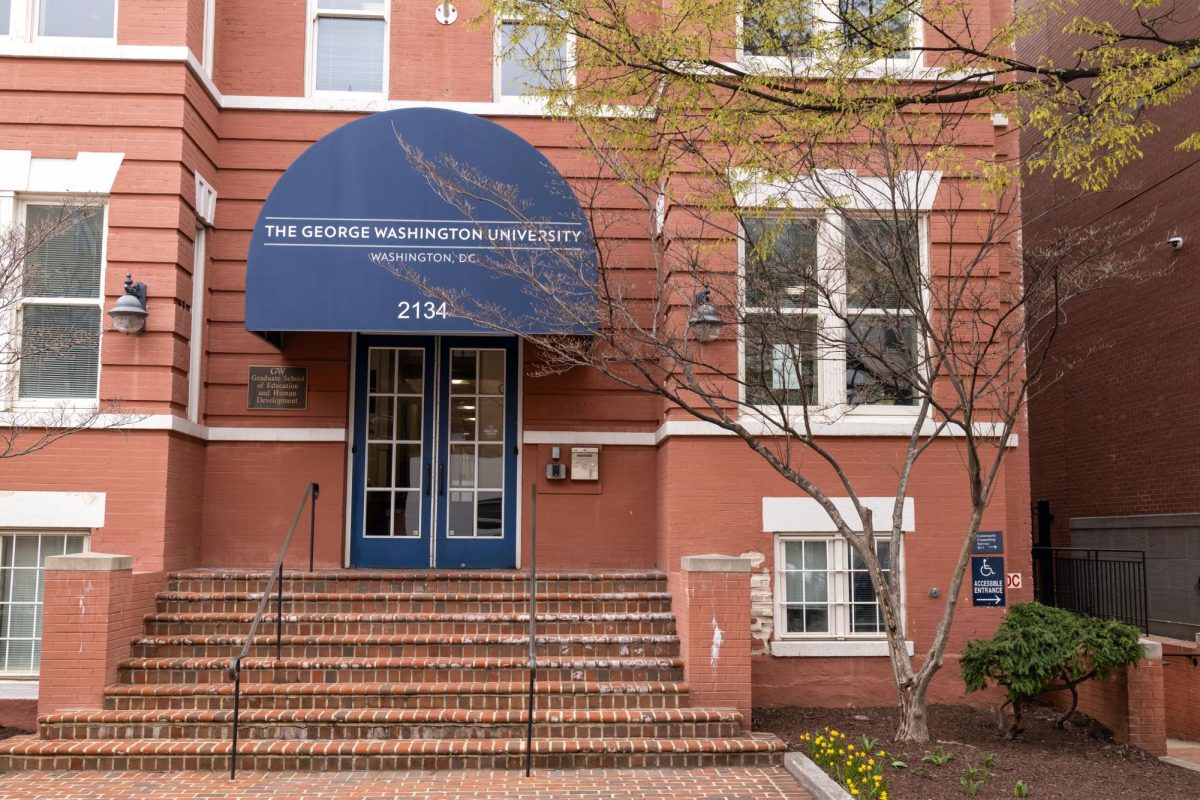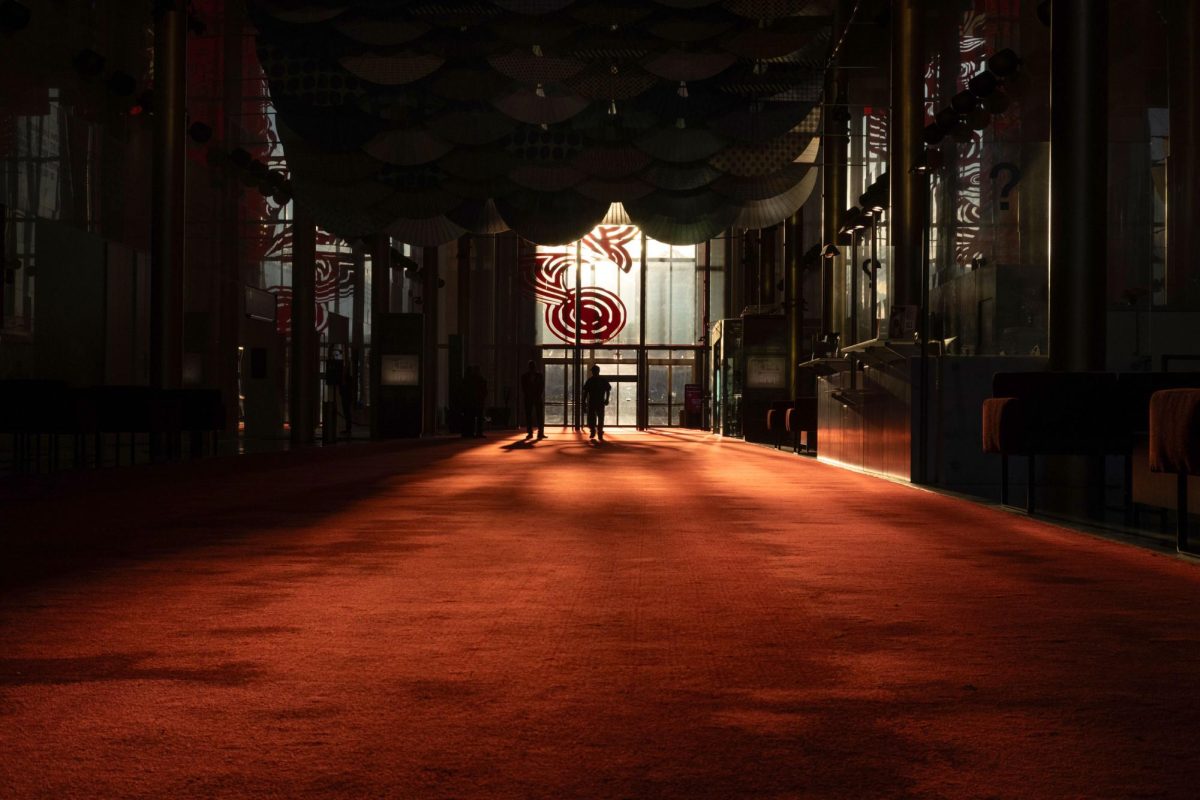After an absence of almost a year, 14 members of the Sigma Alpha Epsilon fraternity returned to their house on 2034 G St. Aug. 15.
The house, owned by a corporation of Sigma Alpha Epsilon brothers and alumni, was condemned last August after an unannounced inspection by D.C. fire officials, who cited a number of health and safety violations.
Sigma Alpha Epsilon President Andrew Hopkins, a junior, said the fraternity took out an $800,000 loan backed by alumni to pay for the renovations. He said the renovations, which started in March, took about five months to complete. The fraternity also received $30,000 from its national organization.
While mostly cosmetic in nature, the construction included adding a full kitchen, central air conditioning and a full range of safety devices such as fire extinguishers and fire alarms.
An off-campus fraternity
Sigma Alpha Epsilon has about 45 members and has been unrecognized by the University since 1993. Hopkins said the University currently has no jurisdiction over the operations of the fraternity.
“(Being an off-campus fraternity) allows us to stay out of political aspects of the IFC,” Hopkins said.
Hopkins said lack of recognition allows the fraternity to have more freedom in its decisions about the house and rush events.
“We don’t have to deal with deadlines, and it allows us to have government over the house,” Hopkins said. “It forces us to take responsibility for our actions, to police ourselves.”
Hopkins said the fraternity’s national office monitors each chapter and can give out penalties and fines. But Hopkins said not everything about being an off-campus fraternity has benefits.
“We’re excluded from Greek Week and other Greek events,” he said. “We’re not allowed to have mixers (with sororities), but we can have closed parties and invite whoever.”
Ernie Kimlin, interim director of the Office of Greek Affairs, said Sigma Alpha Epsilon is “not being supported” by the Office of Greek Affairs or by the IFC.
“Any brothers or recruits are losing out on the Greek experience,” Kimlin said. “They’re unable to participate in any events like recruitment events, Greek Week and others.”
Jared David, president of the IFC, said the organization has no contact with the fraternity and declined comment for this story.
Hopkins said the fraternity has no plans to seek recognition in the near future, and Sigma Alpha Epsilon’s national office supports the chapter’s decision.
“I don’t see coming back on campus happening,” Hopkins said. “Our national (office) sees us as the building block of the fraternity, and they allow us to take the path we choose to take.”
He also said the fraternity’s alumni support the decision to remain unrecognized.
Kimlin said the IFC would consider adding other chapters, but did not mention Sigma Alpha Epsilon by name.
“I believe that the IFC would like to add as many groups as they can, as long as they are strong organizations and support the IFC’s policies,” he said.
A new brotherhood
Hopkins said he sensed apathy among the members last year because the fraternity did not have its house. But the return to the house has changed their sentiments, he said.
“The brotherhood is changing, the apathy of the past has gone 180 degrees,” Hopkins said. “Now our brotherhood is stronger, the seniors are involved, and the new guys have stepped it up.”
He also said the house helps with Sigma Alpha Epsilon’s goal to have a stronger brotherhood and social presence.
“Just being around the house is good because the brothers can gather,” he said. “We eat lunch together out front every day.”
Hopkins said the chapter does not plan to have any more large open parties.
“We’re not going to supply the campus like previous years,” he said. “We plan to have smaller parties and invite mostly brothers and their friends.”
Assistant Vice President for Student and Academic Support Services Mike Gargano said he was glad to see Sigma Alpha Epsilon return to their house, despite any past occurrences.
“I trust they’d conduct themselves as young men,” he said. “And, in fact, they’d be good contributors. That’s our expectation with all students.”
Hopkins said the fraternity operates in basically the same way as IFC-recognized fraternities in regards to rush and community service. The fraternity added 17 freshmen last year and intends to add more. The chapter holds rush events like other fraternities, but Hopkins said he prefers freshmen to come by before and introduce themselves.
“We’re looking for guys interested in our traditions and the social standing of our fraternity,” he said.
The chapter performed a number of community service activities, such as participating in the AIDS Walk and the Breast Cancer Walk, helping freshmen on move-in day, and coaching track and field at a local middle school last year, Hopkins said.
The chapter also has an annual Halloween Haunted House for neighborhood children.
Hopkins said safety issues, which are discussed at IFC meetings and training sessions for recognized fraternities, are brought back from the Sigma Alpha Epsilon National Conference. He said a number of brothers have attended the conference.
A tarnished history
In the past, the fraternity’s relations with the University have appeared strained. In a 1998 Hatchet article, they were called a “thorn in our side” by Tracie Anzaldi, director of the Office of Greek Affairs, and a “black eye to the whole Greek-letter community” by Gargano.
In a 1999 Hatchet article, then Delta Tau Delta President Jeff Butler called Sigma Alpha Epsilon “a danger to all members of the GW community.” In 1998 and 1999, Sigma Alpha Epsilon received letters from the IFC and the University’s legal counsel urging them to reform their behavior.
A GW judicial report on Sigma Alpha Epsilon provided to The Hatchet in 1999 included allegations of physical altercations, destruction of property, attempted burglary, assault of a police officer and sexual assault.
At the time Sigma Alpha Epsilon members denied the charges and questioned the validity of the report. They said no UPD or MPD reports were brought forth and their national office was not notified.
Hopkins said the reputation was unfair.
“We’re always under the watchful eye of GW, and being close to UPD, things were blown out of proportion,” he said. “Those events involved students who have since graduated. Every other fraternity has problems, and we’ve been in the spotlight for eight years.”
The fraternity has also had problems with Delta Tau Delta, but Hopkins said these problems are a thing of the past.
“Those conflicts ended with the class of 2000,” said Hopkins. “The senior and junior class are tight with brothers from other fraternities, including (Delta Tau Delta), and I can’t think of any fraternity-on-fraternity conflict in recent years.”
Hopes for the future
Hopkins said other fraternities have supported Sigma Alpha Epsilon’s return to campus since the organization lost its house last year.
“When we lost our house, we got nothing but good words from Delt and everybody else,” he said. “They supported us and we all put aside any past conflict.”
Hopkins said Sigma Alpha Epsilon’s return to its house signals the organization’s desire to remain a part of the Greek-letter community. He also said the group has no plans to sell its house.
“If there’s an offer someday there’s a chance, but not in the near future,” he said. “The house means a lot to a lot of people, and so many people have worked on this, we intend to be here awhile.”
Hopkins also said he was “really disappointed” that fraternities like Sigma Chi and Alpha Epsilon Pi lost recognition.
“Whether you think a chapter is strong or weak, losing one pulls down the whole Greek community. You wonder who’s next,” Hopkins said.
Sigma Chi’s national organization revoked the chapter’s charter in 2000 for a hazing incident, according to a February 2000 Hatchet article. Alpha Epsilon Pi lost its IFC recognition in 2001 after two hazing incidents, according to a March 2001 Hatchet article.
“That’s another plus of being off campus, we don’t have to worry if we’re next to go,” he said.





